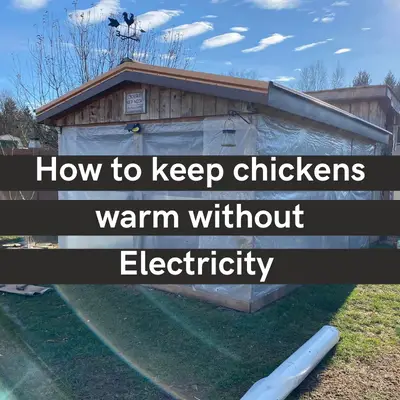Keeping your chickens warm during the colder months is important for their health and well-being. If you don’t have access to electricity, there are a few ways you can keep your chickens warm without it.
Chickens are able to regulate their body temperature to a certain extent, but they do rely on external sources of heat to keep warm, especially in cold weather. Chickens have a natural tendency to huddle together to conserve heat, and they will fluff their feathers to create an insulating layer of air around their bodies.
However, in extreme cold weather, chickens may not be able to generate enough body heat to keep themselves warm, and they may need additional help from external sources of heat.
Let’s see some methods you can use on how to keep your flock warm during the coldest nights without electricity.
1. Insulate the chicken coop
Insulating the chicken coop is an effective way to keep your chickens warm in cold weather. Here are some steps you can follow to insulate your chicken coop:
- Identify areas that need insulation: Look for areas where heat can escape, such as gaps around windows and doors, and thin walls or ceilings.
- Choose an insulation material: There are several options to choose from, including straw, wood shavings, foam board, or fiberglass insulation. Consider the availability, cost, and effectiveness of each material in your location.
- Install the insulation: You can use staples, nails, or adhesive to secure the insulation to the walls, ceiling, and floor of the coop. Make sure to fill in any gaps or voids to prevent heat from escaping.
- Check for drafts: Use weatherstripping or plastic sheeting to seal any gaps around windows or doors, and cover any ventilation openings with wire mesh to prevent drafts from entering the coop.
By following these steps, you can help keep your chickens warm and comfortable during the colder months.
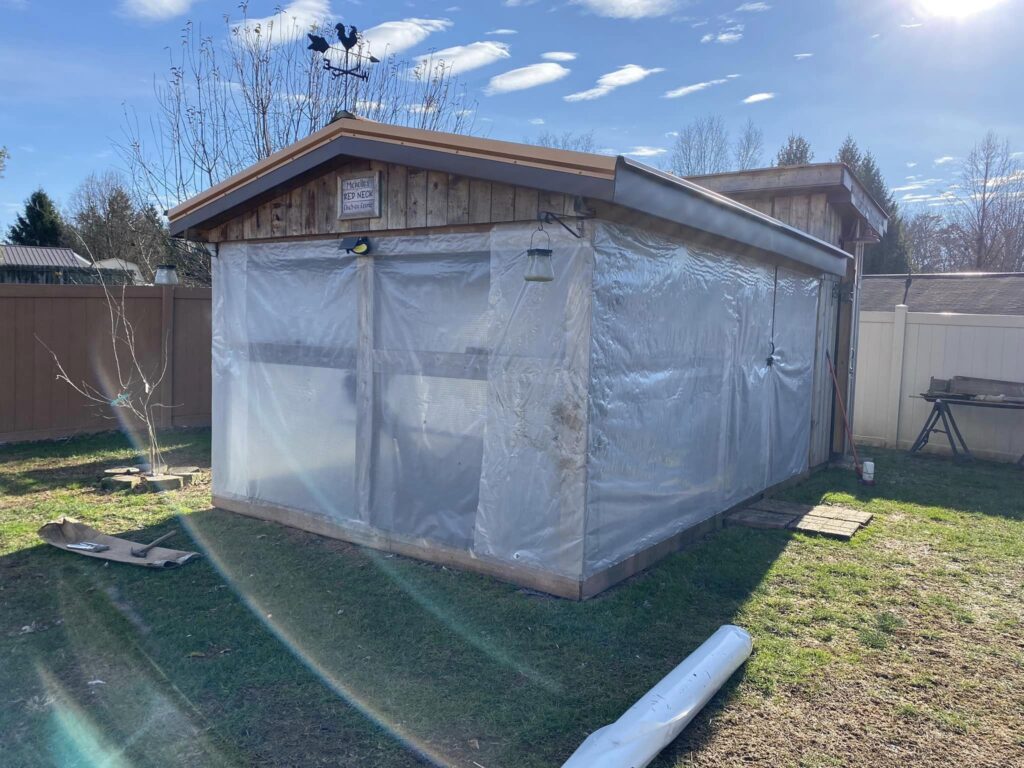
Cheap ways to insulate the chicken coop
Here are a few cheap ways to insulate your chicken coop:
- Use straw or wood shavings: Both of these materials are inexpensive and effective at insulating the coop. Straw can be used as bedding, while wood shavings can be used as both bedding and insulation.
- Use foam board: This type of insulation is made of polystyrene or polyurethane and is available at most home improvement stores. It’s lightweight and easy to install, but may not be as effective as other types of insulation in extreme cold weather.
- Use old blankets or towels: If you have old blankets or towels that you no longer use, you can repurpose them as insulation in the chicken coop. Simply hang them over windows or doors, or place them on the walls or ceiling to add an extra layer of insulation.
- Use bubble wrap: Bubble wrap is a cheap and effective way to insulate windows and doors. Simply cut the bubble wrap to size and tape it to the inside of the window or door to create an insulating barrier.
By using these inexpensive materials, you can effectively insulate your chicken coop and keep your chickens warm in cold weather.
2. Provide a draft-free environment
A draft-free environment is important for keeping your chickens warm in cold weather. Drafts can cause the temperature inside the coop to drop, which can be harmful to your chickens. To provide a draft-free environment for your chickens, you can follow these steps:

- Seal gaps around windows and doors: Use weatherstripping or plastic sheeting to seal any gaps around windows and doors. This will help keep drafts out of the coop.
- Cover ventilation openings: Use wire mesh or a similar material to cover any ventilation openings in the coop. This will allow air to flow through the coop, but will prevent drafts from entering.
- Keep the coop clean: Cleaning the coop regularly and removing any wet bedding or manure will help prevent the buildup of dampness and cold spots in the coop.
By following these steps, you can create a draft-free environment for your chickens and help them stay warm in cold weather.
3. Use bedding
Using bedding in your chicken coop can help insulate the coop and keep your chickens warm in cold weather. Bedding refers to the material that you place on the floor of the coop for your chickens to sleep on. Some common options for bedding include straw, wood shavings, and shredded paper.
To use bedding in your chicken coop, simply add a thick layer of the chosen material to the floor of the coop. The bedding should be at least a few inches thick to provide insulation and keep your chickens warm. Make sure to clean the coop regularly and remove any wet or soiled bedding to prevent the buildup of dampness and cold spots in the coop.
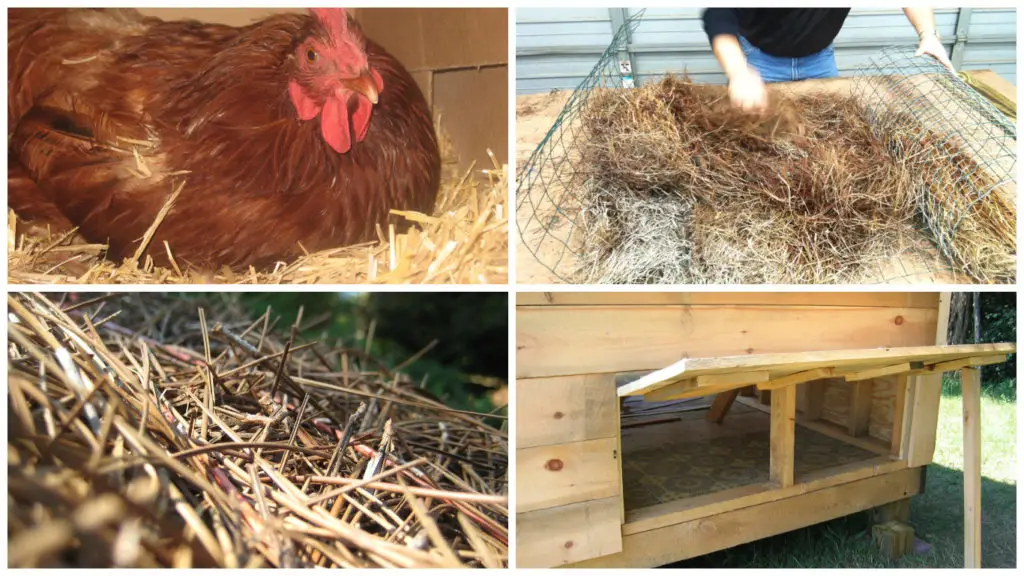
Bedding serves several purposes in the chicken coop. In addition to insulating the coop and keeping your chickens warm, bedding helps absorb moisture and ammonia from chicken waste, which helps keep the coop clean and healthy. It also provides a soft, comfortable surface for your chickens to sleep on.
By using bedding in your chicken coop, you can help keep your chickens warm and comfortable in cold weather and create a healthy, hygienic environment for them.
4. Provide EXTRA food
Providing extra food for your chickens in cold weather can help them stay warm and maintain their body temperature. Chickens burn more calories in the winter to stay warm, so it’s important to provide them with plenty of high-quality feed to help them maintain their body temperature.
Here are a few tips for providing extra food for your chickens in cold weather:
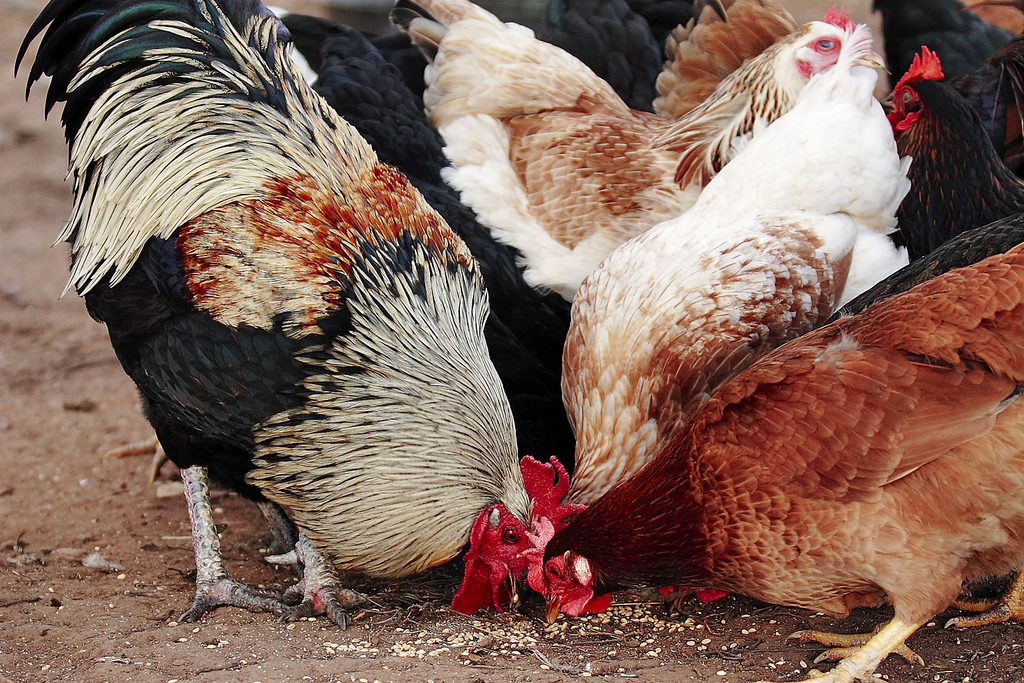
- Offer a high-quality, balanced diet: Make sure your chickens have access to a complete and balanced feed that includes all the nutrients they need. In the winter, you may want to consider switching to a higher-energy feed to help your chickens maintain their body temperature.
- Offer treats: You can provide your chickens with treats, such as chopped vegetables, fruits, or seeds, to supplement their diet and provide them with extra energy.
- Make sure the feed is always fresh: Chickens are more likely to eat if the feed is fresh, so make sure to refill their feeders regularly and remove any spoiled or moldy feed.
- Keep the feeders clean: Clean the feeders regularly to prevent the buildup of mold or bacteria, which can cause illness in your chickens.
By following these tips, you can help your chickens stay warm and healthy in cold weather by providing them with extra food and a high-quality diet.
5. Keep water from freezing
If you don’t have access to electricity, there are a few ways how to keep chickens water from freezing in the winter without electricity:
- Use a thermal water jug or bucket: These types of containers are designed to insulate the water and keep it from freezing. They are made of materials like foam or metal that retain heat and can be filled with warm water to help keep the water in the container from freezing.
- Use a hand-crank water heater: Some portable water heaters are powered by a hand crank and do not require electricity. These heaters can be placed in the water dish to keep the water from freezing.
- Use a solar-powered water heater: Some water heaters are powered by solar panels and do not require electricity. These heaters can be placed in the water dish to keep the water from freezing
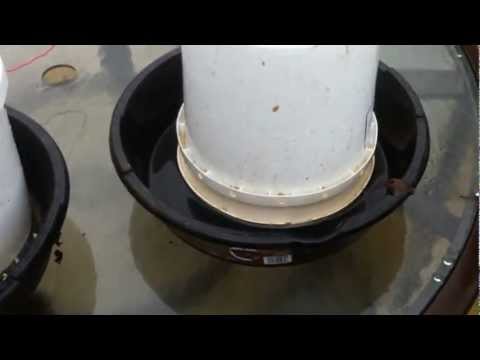
By following these tips, you can help keep your chickens’ water from freezing and ensure that they have access to fresh, unfrozen water at all times, even without electricity.
Does straw help keep chickens warm?
Yes, straw can help keep chickens warm in cold weather. Straw is an effective insulation material and can be used in several ways to help keep your chickens warm.
One way to use straw to keep chickens warm is to add a thick layer of straw as bedding in the coop. The straw will help insulate the coop and provide a warm, comfortable place for your chickens to sleep. You can also use straw to insulate the walls, ceiling, and floor of the coop by packing it tightly into any gaps or voids.
Another way to use straw to keep chickens warm is to place a bale of straw in the coop for your chickens to roost on. The straw will provide an extra layer of insulation and help keep your chickens warm as they sleep.
By using straw in these ways, you can help keep your chickens warm and comfortable in cold weather.
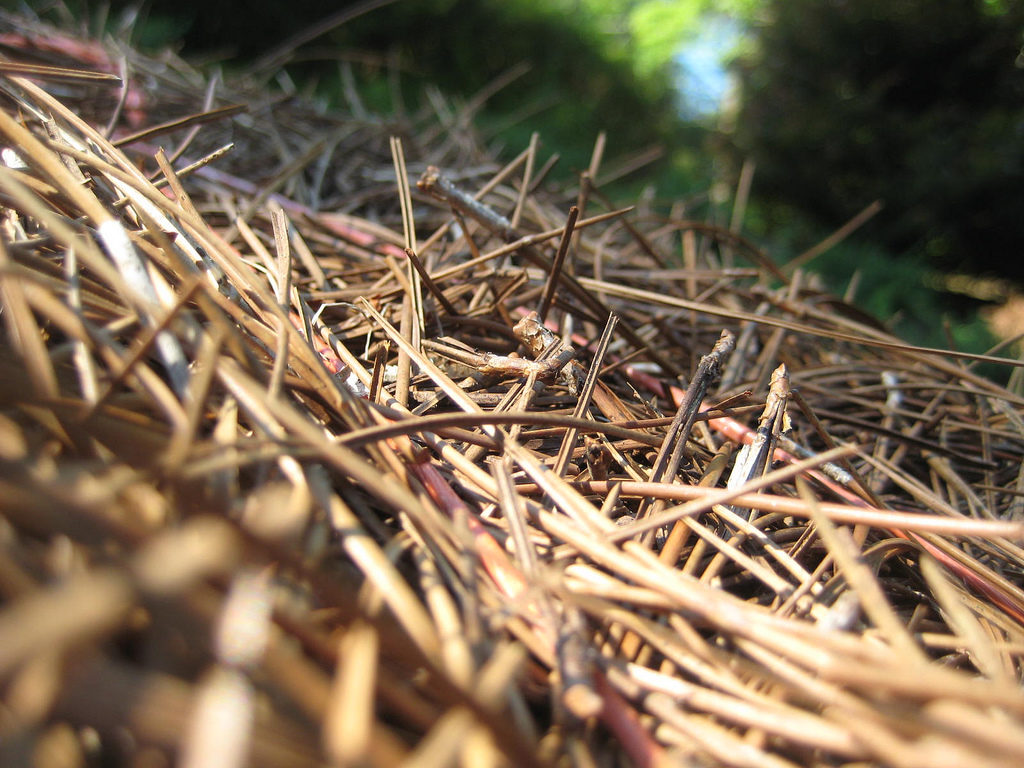
Can chickens survive winter without heat?
In some cases, chickens may be able to survive winter without heat if they have access to a well-insulated coop, plenty of food and water, and are able to maintain their body temperature through natural behaviors like huddling together and fluffing their feathers. However, in extreme cold weather, chickens may not be able to generate enough body heat to keep themselves warm, and they may need additional help from external sources of heat.
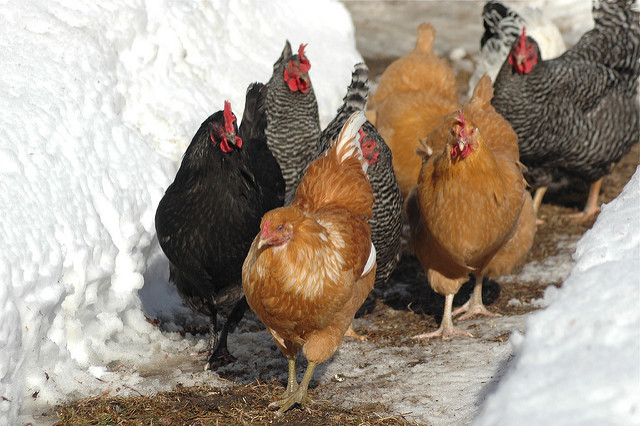
If you live in an area with very cold winters, it’s important to provide your chickens with a well-insulated coop and a heat source to help them stay warm. Without these resources, your chickens may be at risk of cold stress, which can lead to illness or death.
It’s also important to make sure your chickens have access to plenty of high-quality feed and fresh, unfrozen water, as these are essential for their health and well-being in cold weather. By providing your chickens with the resources they need to stay warm and healthy, you can help them survive the winter.
Do wood chips keep chickens warm?
Wood chips can help keep chickens warm in cold weather, but they are not as effective as some other materials at insulating the coop. Wood chips are a common choice for bedding in chicken coops because they are inexpensive and absorb moisture well, but they do not provide as much insulation as straw or wood shavings.
To keep your chickens warm in cold weather, it’s important to use a combination of insulation and bedding in the coop. You can use wood chips as bedding and add additional insulation, such as straw or wood shavings, to the walls, ceiling, and floor of the coop to help keep the coop warm. You can also use a heat source, such as a heat lamp or small heater, to provide additional warmth for your chickens.
What do you feed chickens on a cold day?
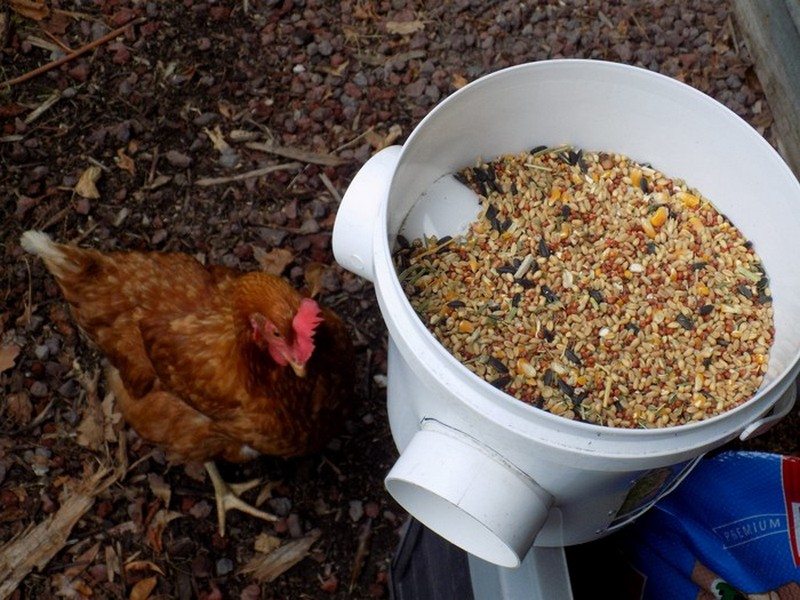
It’s important to provide your chickens with a high-quality, balanced diet year-round, but it’s especially important in cold weather when they need extra energy to stay warm. Here are a few tips for feeding your chickens on a cold day:
- Offer a high-energy feed: In the winter, you may want to consider switching to a higher-energy feed that contains more fat and protein to help your chickens maintain their body temperature.
- Offer treats: You can provide your chickens with treats, such as chopped vegetables, fruits, or seeds, to supplement their diet and provide them with extra energy.
- Keep the feed fresh: Chickens are more likely to eat if the feed is fresh, so make sure to refill their feeders regularly and remove any spoiled or moldy feed.
- Keep the feeders clean: Clean the feeders regularly to prevent the buildup of mold or bacteria, which can cause illness in your chickens.
By following these tips, you can help your chickens stay warm and healthy in cold weather by providing them with a high-quality, balanced diet and plenty of extra energy.
Can chickens drink cold water in winter?
It’s important for chickens to have access to fresh, unfrozen water at all times, including in cold weather. While chickens can drink cold water in winter, it’s best to provide them with water that is at a comfortable temperature for them to drink. Chickens are more likely to drink more water if it is at a temperature that is comfortable for them.
What temperature is comfortable?
The temperature that is comfortable for chickens to drink water at may vary depending on the temperature of their environment and their individual preferences. In general, chickens tend to prefer drinking water that is around room temperature, which is typically between 60-70°F (15-21°C).
If the water is too cold, chickens may be less likely to drink it, which can lead to dehydration. On the other hand, if the water is too warm, chickens may not drink as much water as they need, which can also lead to dehydration.
Should I tarp My chicken Run for winter?
Tarping your chicken run in the winter can provide additional protection from the elements and help keep your chickens warm and dry. Tarps are an effective way to create a draft-free environment and can be used to cover the roof, walls, or entire run to keep the wind and snow out.
However, it’s important to make sure that the tarp is secure and that there are no gaps or openings where drafts can enter the run. You should also make sure that the tarp is high enough to allow for ventilation and that the chickens have plenty of fresh air.
In addition to tarping the run, you should also make sure to provide your chickens with a well-insulated coop and a heat source, if necessary, to help them stay warm in cold weather.
Conclusion
In conclusion, keeping your chickens warm during the colder months is important for their health and well-being. If you don’t have access to electricity, there are a few ways you can keep your chickens warm without it. Insulating the coop, using a heat source like a heat lamp or small heater, creating a draft-free environment, adding bedding, providing extra food, and ensuring that water does not freeze are all effective methods for keeping chickens warm without electricity. By following these tips, you can help your chickens stay warm and comfortable throughout the winter.
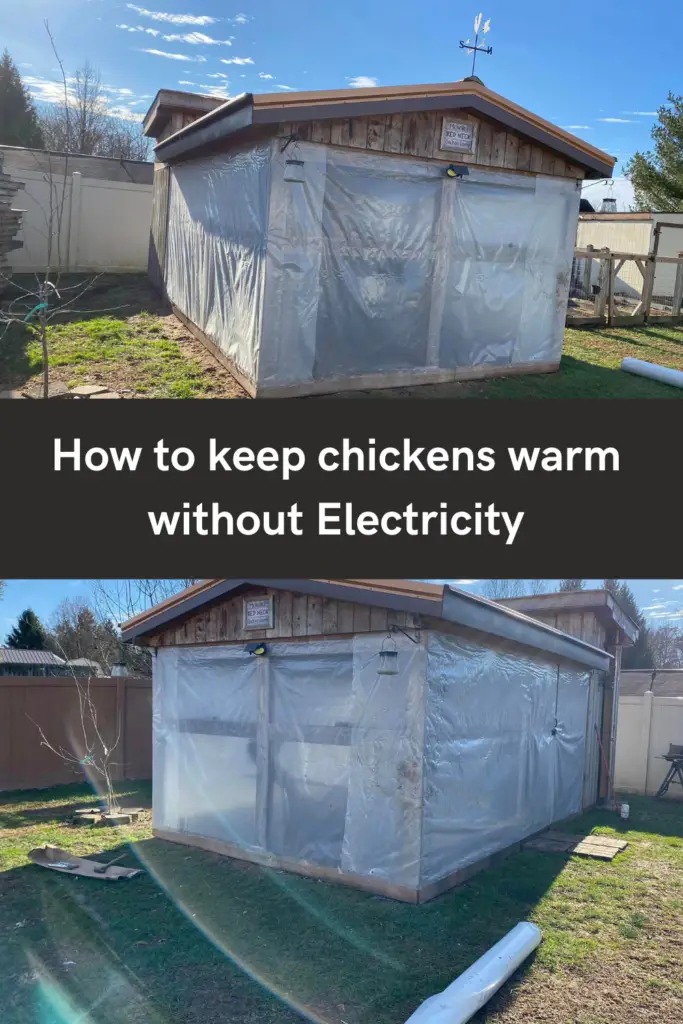
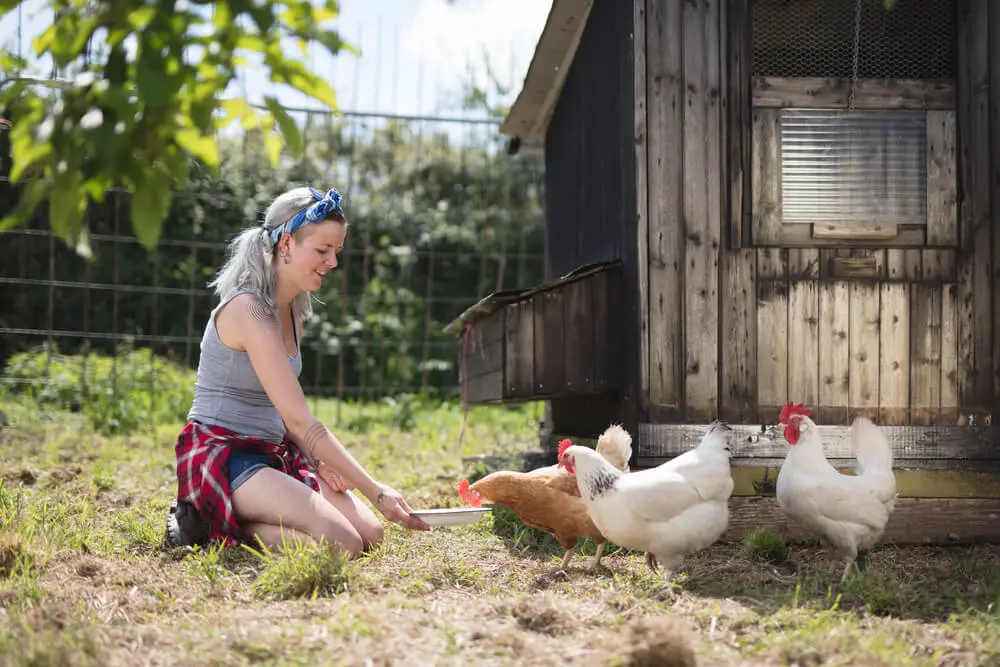
Shannon Stansberry has been engaged in the business of raising chickens for more than 12 years. In 2016, she accomplished the Agriculture & Natural Resources program at Mt. San Antonio College. At present, she tends to more than 80 chickens on her 4-hectare farm. Shannon regularly shares her insights and experience on how to raise healthy and contented chickens on the platform Typesofchickens.com
